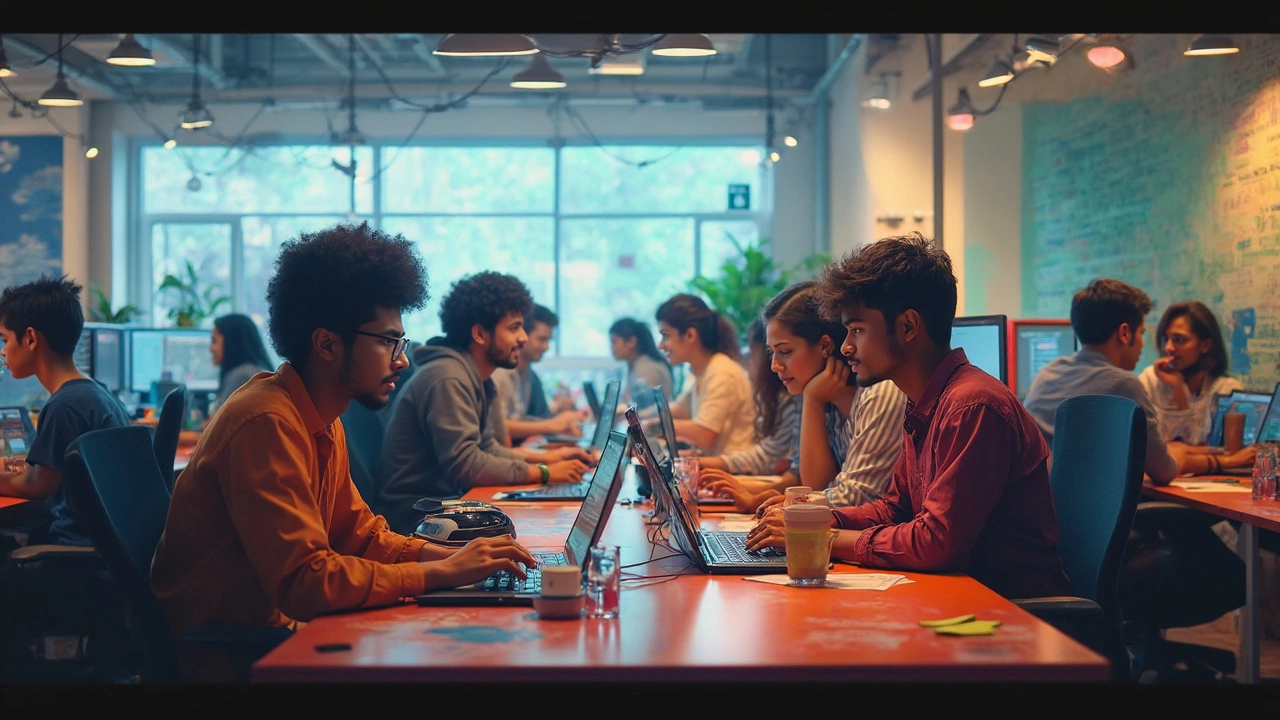
Ever noticed how coders seem to land those six-figure jobs, even right out of college? It’s not just hype—there’s real fuel behind those fat paychecks. We’re talking about companies fighting tooth and nail just to hire anyone who can sling code. And, honestly, it’s because tech now runs our lives. Your phone, your car, even your fridge—it all leans on code.
But that’s only part of the story. Not enough people are learning to code, at least not well enough to hit the ground running on real-world projects. So, when demand for talent totally outpaces supply, it sends salaries up fast. If you’ve been thinking about diving into coding classes, you’re catching on to a smart move. There’s a reason those bootcamps and online courses are everywhere these days.
Here’s what’s wild: a solid coder doesn’t just build apps or websites. Sometimes, a single line of code can save a company millions. That kind of impact? You can bet employers will pay through the nose for it. If you’re looking to level up for a future-proof career, learning to code pretty much puts you on the fast track.
- Tech Is Everywhere—And It Needs Coders
- The Supply and Demand Problem
- What Makes Coding Hard Anyway?
- How Companies Fight for Talent
- Hidden Perks and Job Security
- Should You Learn to Code Now?
Tech Is Everywhere—And It Needs Coders
It’s not just your phone or your laptop—tech is baked into just about everything these days. Grocery stores use digital systems to track what’s on the shelves. Hospitals run on smart devices and custom apps. Even your new car runs more lines of code than all the NASA computers that sent astronauts to the moon. The auto industry alone is packed with software: one recent model of Ford had over 150 million lines of code running under the hood.
This nonstop growth isn’t slowing down. Every new gadget, every website you visit, every app you swipe—it all needs someone to write and maintain the code. According to the U.S. Bureau of Labor Statistics, the demand for software developers is expected to jump 25% by 2032, way faster than most other jobs out there. That’s a serious gap that companies are racing to fill.
If you’re thinking this is just about Silicon Valley, think again. Coding skills are wanted in banks, retail, manufacturing, healthcare, gaming, and even farming. Farmers use drones and sensors to monitor fields—that’s all software behind the scenes. Retail stores use smart checkout systems, shipping trackers, and websites programmed by, well, coders.
- Retail: Online shopping platforms, payment systems, and site personalization all depend on coding pros.
- Healthcare: From managing patient records to AI-powered diagnostics, skilled programmers keep the systems running and secure.
- Entertainment: Streaming services and video games need sharp tech jobs minds to keep fans happy and glued to screens.
It’s no exaggeration: everything that can be automated or connected is getting a software upgrade—and every one of those upgrades needs a team of coders behind it. So, if you learn to code, you’re not just locked into traditional IT or web development. Pretty much any field you can name needs people who know how to build and fix software.
The Supply and Demand Problem
There just aren't enough skilled coders to go around. Tech companies need all the help they can get, but the number of people who can really deliver is way smaller than you’d expect. Every year, you’ll see reports from places like the U.S. Bureau of Labor Statistics showing that software developer jobs are growing much faster than most other gigs—about 25% growth from 2022 to 2032. That’s way above average. Meanwhile, a ton of jobs are going unfilled because there simply aren’t enough people ready to jump in.
So, what causes this shortage? It’s a mix of factors:
- Coding isn’t easy to learn well, and plenty of folks either change direction or drop out halfway through training.
- Tech companies have exploded in the last decade, making the need for programmers and tech jobs skyrocket.
- Pretty much every industry—finance, healthcare, entertainment, even agriculture—now needs good coding skills.
This means companies are basically in a bidding war for talent. And it’s not just the big Silicon Valley brands either. Think banks, streaming services, and even car makers looking for people to make their latest gadgets and internal apps work right.
| Year | Open Coding Jobs (US) | Computer Science Graduates (US) |
|---|---|---|
| 2023 | 1,200,000+ | ~100,000 |
| 2024 | 1,350,000+ | ~110,000 |
See that gap? That’s why coding salaries can climb so fast. Companies simply have no choice if they want to get their projects done. So, if you’re considering coding classes, you’re stepping into a field where demand heavily outweighs supply—and that always leads to better paychecks and more options.
What Makes Coding Hard Anyway?
Let’s set the record straight—coding isn’t just typing out some magic words and watching apps appear. There’s way more to it, and that’s exactly why not everyone sticks with it. First off, programmers hardly just memorize stuff. You constantly solve new problems. Every project has its own weird bugs, those annoying little issues that pop up for no clear reason. It’s almost like playing detective, but your clues are error messages and broken screens.
The biggest challenge? Technology is always changing. New programming languages, new frameworks, new tools—it’s nonstop. Even seasoned coders have to put in serious time keeping up with what’s hot and what’s not. A study from Stack Overflow found that over 70% of professional developers have to learn a new tool or language every few months on the job. That’s a lot of brain work.
But there’s more. A lot of coding isn’t solo work. It’s teamwork. You’re reading code someone else wrote (which can be super confusing), or you’re explaining your own logic to people who aren’t into tech at all. Communication skills come in handy—big time.
Here’s an idea of what makes coding tough:
- You can spend hours fixing just one stubborn bug.
- Expect to Google stuff—maybe dozens of times a day.
- Code has to handle all the ways a user can mess things up.
- Details matter—one character wrong, and nothing works.
- Projects last weeks, even months, meaning you need patience and grit.
And let’s not ignore the huge number of programming languages. Need to pick up Python for one project and then switch to JavaScript the next week? No problem—if you’re up for some mental gymnastics. This constant context-switching is what weeds out all but the most determined programmers.
Here’s a quick data snapshot of common coding headaches, from a survey of U.S. tech workers in 2024:
| Pain Point | % Affected |
|---|---|
| Debugging tricky issues | 64% |
| Keeping up with new tech | 55% |
| Understanding old code | 43% |
| Communicating with team | 37% |
This mix of problem-solving, endless learning, teamwork, and stubborn details is why coding is no walk in the park—and why those who get good at it see big paychecks.

How Companies Fight for Talent
If you’ve ever wondered why programmers seem spoiled with paychecks and perks, a lot of it boils down to one thing: companies are in a constant tug-of-war trying to lock down the best talent. We’re talking signing bonuses, stock options, unlimited vacation, and remote work. BigTech and startups alike know how tough it is to fill tech jobs. As of 2024, reports showed more than 400,000 unfilled tech openings in the US alone, and the story is pretty similar worldwide.
The craziest part? It’s not only Google or Microsoft in the chase. Banks, retailers, hospitals, you name it—they all need coders to build and maintain their tools. Some companies even poach engineers from competitors with higher offers. Recruiters openly hunt on LinkedIn, sending direct messages and offers to coders who aren’t even job-hunting. If you’re decent at coding, you could get multiple job offers at once without even filling out a ton of applications.
Just to show how this plays out, check these numbers from a 2024 CompTIA study:
| Industry | Open Tech Roles | Average Salary (USD) |
|---|---|---|
| Software & Internet | 90,000 | $135,000 |
| Financial Services | 75,000 | $126,000 |
| Healthcare | 32,000 | $114,000 |
Beyond money, companies dangle stuff like paying for advanced coding classes, free meals, and wellness stipends to keep coders on board. Some even let teams decide their own hours as long as the work gets done. No surprise people are scrambling to learn coding now—the field keeps offering more than just a paycheck. If you want a job market where bosses compete for you, tech’s still the best bet around.
Hidden Perks and Job Security
The headline number on a coder’s paycheck isn’t the only thing to look at. There’s a whole buffet of perks that make coding jobs even sweeter. For one, remote work is way more common in tech than almost any other field. Big-name companies like Google and GitHub have teams spread out all over the world, so living in a pricey city isn’t really a requirement. You want to work from a beach town or your own living room? Coding lets you do that.
Then you’ve got health insurance, stock options, paid parental leave, generous time off, and even tech stipends just to upgrade your laptop or buy noise-canceling headphones. Many tech jobs offer learning budgets so you can take online coding classes for free. It’s not just the giant firms. Even startups these days know they have to keep up.
Now, let’s talk job security. The world needs more programmers than there are people who can code well. The U.S. Bureau of Labor Statistics said software developer jobs are expected to grow 25% from 2022 to 2032, which is a lot faster than most industries. That demand is one reason tech workers bounce back from layoffs faster than almost anyone else. If you have solid coding chops and stay updated, you’re hardly ever out of work for long.
Take a quick glance at what’s on the table for a typical coder compared to the average U.S. worker:
| Benefit | Coding Jobs | Other Jobs |
|---|---|---|
| Remote Work | 70%+ of openings | 15% of openings |
| Learning Budget | Common (up to $2,000/year) | Rare |
| Stock Options/Equity | Often offered | Uncommon |
| Job Growth (2022-2032) | 25% projected | 3% projected |
So if you’re thinking about switching to a coding job, or just starting out, remember it’s not just about the cash. The extras and solid job security make the whole package tough to beat. That’s why coding classes keep filling up—folks want in on these perks, too.
Should You Learn to Code Now?
If you're asking yourself this question, you're not alone. Right now, the number of coding job openings far outpaces the number of trained programmers available to fill them. According to the U.S. Bureau of Labor Statistics, software developer jobs are expected to grow by 25% through 2032—way faster than the average for all careers. Tech companies just can’t hire fast enough. Even smaller businesses outside of Silicon Valley are desperate for people who can code.
"Everybody in this country should learn to program a computer, because it teaches you how to think." — Steve Jobs
What’s cool is that you don’t need a computer science degree to get your first job. Tons of folks land their first entry-level tech job after finishing coding classes or even teaching themselves online. Big-name companies like Google and IBM have dropped the college degree requirement for many coding roles. They care way more about what you can actually do—can you build, fix, and launch real tech projects?
Here’s a quick snapshot of entry-level pay and job prospects in the tech jobs scene:
| Job Title | Median Starting Salary (US) | Job Growth (2022-2032) |
|---|---|---|
| Software Developer | $85,000 | 25% |
| Web Developer | $77,000 | 16% |
| Data Analyst | $70,000 | 23% |
No question about it: demand for coding is spreading into just about every kind of work. Healthcare, banking, shopping—the whole world depends on solid code now. Companies want people who can problem-solve and pick up new skills on the fly. If you start learning even the basics today, you’ll stand out tomorrow.
If you’re ready to give it a shot, here’s some advice:
- Start small—free online tutorials or beginner bootcamp courses can show you the ropes.
- Don’t get overwhelmed by jargon. It all makes sense after some hands-on practice.
- Work on small projects—a website for a friend, a game, or a simple data tool. You’ll build confidence and skills at the same time.
- Join coding communities. Forums and Discord servers are full of helpful people who remember what it’s like to be new.
The job market is loud and clear: learning to code is still one of the safest bets out there right now. Whether you want a huge salary or just a job that feels future-proof, coding delivers.




